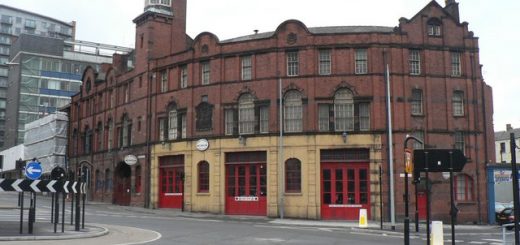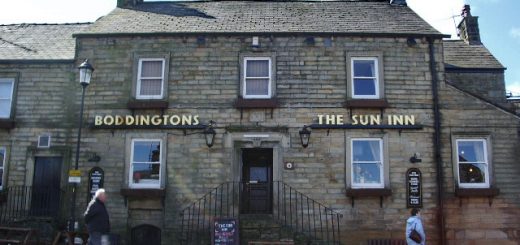Llindir Inn, Henllan
The thatched Grade II listed Llindir Inn dates from 1229 and is certainly one of the oldest pubs in Wales. It is reputed to be haunted by a ghost thought to be named Sylvia, the wife of a sailor who strangled her after finding her in the arms of another man whilst on unexpected shore leave. Dewi Roberts, in The Old Villages of Denbighshire and Flintshire (1999) describes her as ‘an attractive woman in white’ and according to Jack Hallam in The Ghosts Who’s Who (1977), scores of visitors have had experiences, including having bed clothes dragged off them and seeing the apparition referred to in his book as the ‘Lady of Llindir’.
 The Wikipedia entry for Henllan suggests that the story or legend of the haunting possibly originated during World War II in order to attract US soldiers to drink there.
The Wikipedia entry for Henllan suggests that the story or legend of the haunting possibly originated during World War II in order to attract US soldiers to drink there.




Re: Llindir Inn, Henllan
The following folk tale entitled ‘Six and Four are Ten’ appeared in The Welsh Fairy Book by W. Jenkyn Thomas [1908]. It concerns an Inn at Henllan though does not name it.
A CONJUROR, on his way to Llanrwst, turned into the tavern at Henllan one evening and called for a glass of beer and some bread and cheese. When he asked for his reckoning, he was charged tenpence–fourpence for the beer and sixpence for the bread and cheese. This charge he considered outrageous, but he did not condescend to dispute it. He determined, however, to have his revenge, and before departing he took a scrap of paper, wrote on it a spell, and put it under the table leg.
The landlord and landlady went to bed early, telling the maid-servant to clear away the things which had been set before the conjuror. No sooner were their heads on the pillow than they heard shouting and jumping downstairs. The maid was shrieking at the top of her voice:
"Six and four are ten,
Count it o’er again,"
and dancing wildly. Surprised and angry, they asked her what was the matter, but the only answer they received was:
"Six and four are ten,
Count it o’er again"
and the girl went on dancing.
The thought now struck the landlord that the dancer had gone out of her mind. He got up and went down to see. The moment he placed his foot in the room he gave a hop, skip and a jump, joined the girl in her mad dance, and with her he shrieked out:
"Six and four are ten,
Count it o’er again."
The noise was doubled, and if the landlady was surprised and angry before, she was now astounded and furious. She shouted to the scandalous couple to cease their noise, but all to no purpose. They bellowed more loudly than before:
“Six and four are ten,
Count it o’er again,’
and danced still more vigorously.
The landlady could stand it no longer: she left her bed and went downstairs. The sight of her husband and maid shamelessly dancing together and yelling:
"Six and four are ten,
Count it o’er again,"
made her wrath overflow, and she determined to put a atop to the proceedings. Seizing a big stick, she bounded into the room, but before she could belabour the heads and shoulders of the two dancers as she had intended, she found herself capering like them and joining in the chorus:
"Six and four are ten,
Count it o’er again."
The uproar was now great indeed, and the neighbours came to see what was the matter. All who ventured into the room joined in the dance and chorus, and soon the room was full of men and women, leaping and frisking and yelling at the tops of their voices:
"Six and four are ten,
Count it o’er again."
Then one of the spectators, more quick-witted than the rest, remembered that he had seen the conjuror leaving the tavern, and at once guessed that he was responsible for this frantic revel. Hurrying after him, he overtook him on the road to Llanrwst, and begged him to release the people from his spell. The conjuror, chuckling at the humour of the punishment he had meted out, consented. "Take," said he, "the piece of paper which is under the table leg and burn it, and they will then stop their row."
The man ran back as fast as he could, rushed to the table and cast the paper into the fire. Immediately the dancing and shouting ceased, and the performers fell down, panting and exhausted after their exertions.
Re: Llindir Inn, Henllan
I visited the Llindir Inn today, and spoke at length with the landlord. He said that the inn is haunted, no doubt about it. Although he has not seen a manifestation, he said it is a mischevious haunting. Things regularly go missing, and turn up again at a later date. Sometimes the taps are turned on during the night, and not discovered until the landlord gets up in the morning. It isn’t a malicious haunting, but there’s something going on.